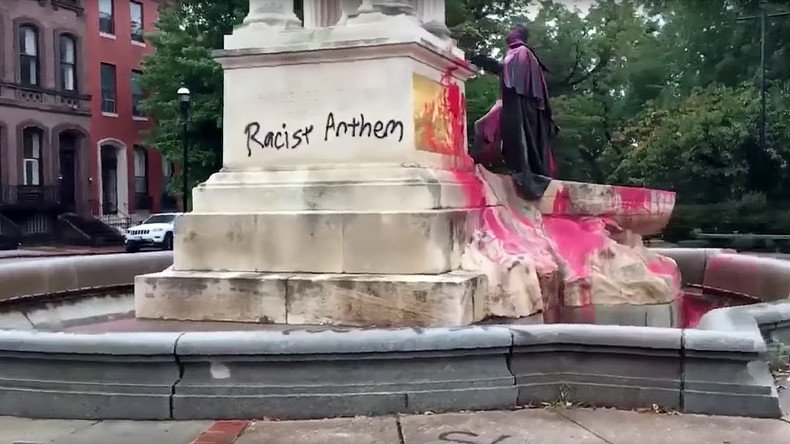Baltimore to keep statue of Star-Spangled Banner composer defaced with ‘Racist Anthem’

A monument to the composer of the US national anthem, whose original third verse has been called racist by left-wing activists, has been defaced in Baltimore. City officials say they will not remove the statue, unlike other memorials around the country.
On Wednesday before dawn, a monument depicting Francis Scott Key, the composer of ‘The Star-Spangled Banner’, was vandalized with the words “Racist Anthem” spray-painted on it. Red paint also appeared to have been splashed on the monument.
"Racist Anthem": The century-old Francis Scott Key Memorial at Eutaw Place in Baltimore was defaced overnight. https://t.co/nWTa2thxX2pic.twitter.com/5vPAqNyTeT
— Colin Campbell (@cmcampbell6) September 13, 2017
The third verse penned by Key is what presumably attracted the vandals’ attention. It has been the focus of Salon columnist Jefferson Morley's attack on the US national anthem, which went as far as calling it a 'neo-Confederate' symbol.
Baltimore Mayor Catherine Pugh says she does not have plans to remove the statue of Key, after a slew of Confederate-era statues were removed earlier this year due to public outcry.
“We can’t ensure it’s not going to happen again,” Pugh’s spokesman Anthony McCarthy said, as cited by the Baltimore Sun.
He continued by mentioning that the mayor would like to see the statue restored.
“We understand the freedom of expression, but there certainly has to be a more constructive and productive way to have a conversation about history,” McCarthy said.
Wednesday marked exactly 203 years since the poem that became the national anthem of the US was written by the Maryland native.
Americans usually sing only the first stanza of Key’s poem, but the third stanza mentions African-American soldiers who fought in the British Colonial Marines during the 1812-1815 war. One verse refers to them as “hirelings and slaves.”
While Key has a history of prosecuting abolitionists and owning slaves, he also helped several African-Americans, fighting for their freedom under a law which prohibited slaveholders from other states to bring slaves to Maryland, by providing legal advice.
City and state officials in Baltimore have for many years seen the anthem as a source of pride and held a bicentennial in 2014 to commemorate the battle and the anthem.
Earlier, a statue of Supreme Court Chief Justice Roger Taney was removed in Maryland’s capital, Annapolis, following an incident of vandalism. Taney presided over the Supreme Court’s 1857 Dredd Scott decision, which ruled that descendants of slaves brought from Africa were not US citizens.
The governor of Maryland ultimately decided that taking the statue down was the right thing to do in response to Taney’s history in the Supreme Court.
The removal of Taney’s statue came after three Confederate monuments of Generals Robert E. Lee and Stonewall Jackson, a Confederate Soldiers and Sailors monument, and a Confederate Women’s monument were taken down in an overnight operation.
The decision followed a far-right rally protesting against the planned removal of a Confederate General Robert E. Lee, held in Charlottesville, Virginia, in August. The protest took a violent turn, when far-right activists clashed with hundreds of counter protesters who turned up at the event. A car struck a crowd of the counter protesters at high speed, killing one person and injuring 19.
READ MORE: Baltimore removes 4 Confederate statues overnight amid fears of violence
President Donald Trump, however, saw the mass removals of Confederate monuments as “foolish,” ruminating whether the founding fathers, George Washington and Thomas Jefferson, would become the next targets.
“Sad to see the history and culture of our great country being ripped apart with the removal of our beautiful statues and monuments,” he wrote in a series of tweets. “You can't change history, but you can learn from it.”














